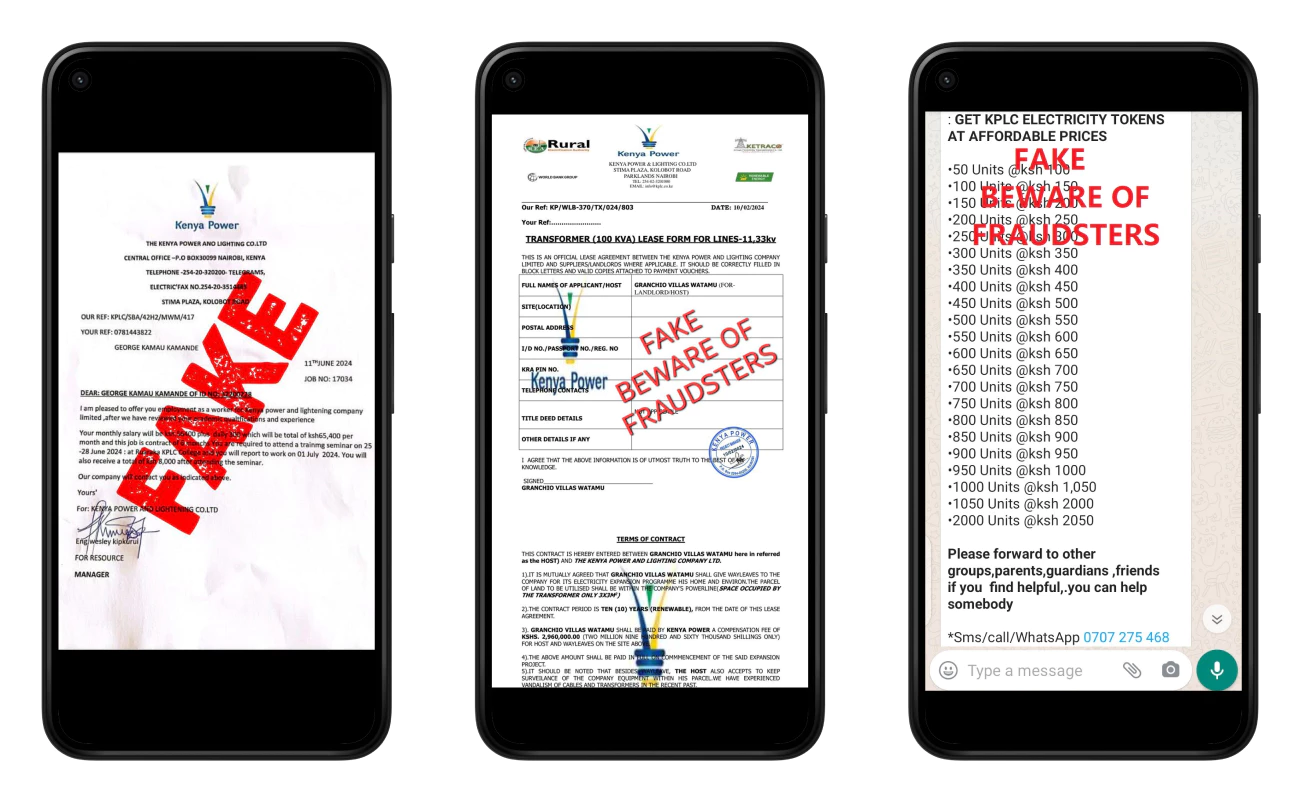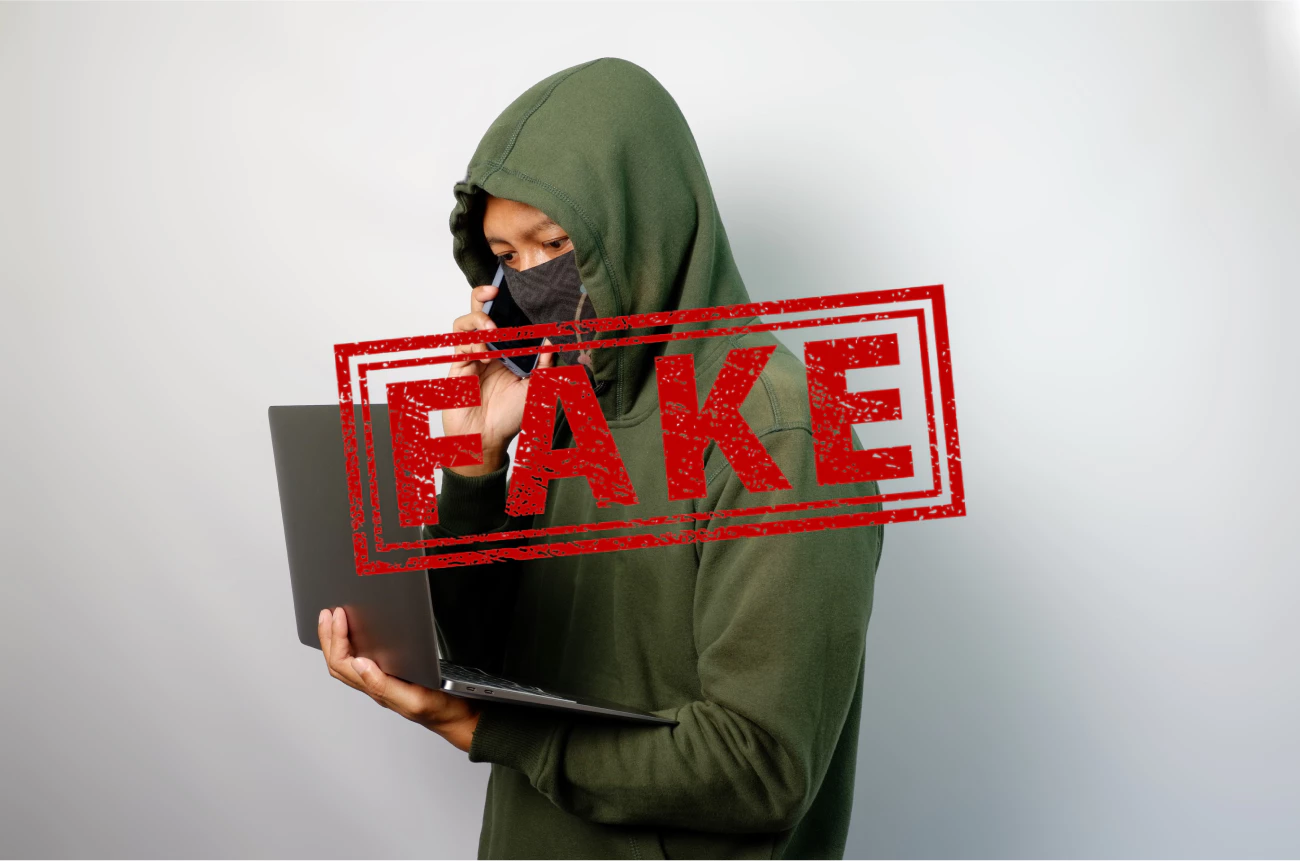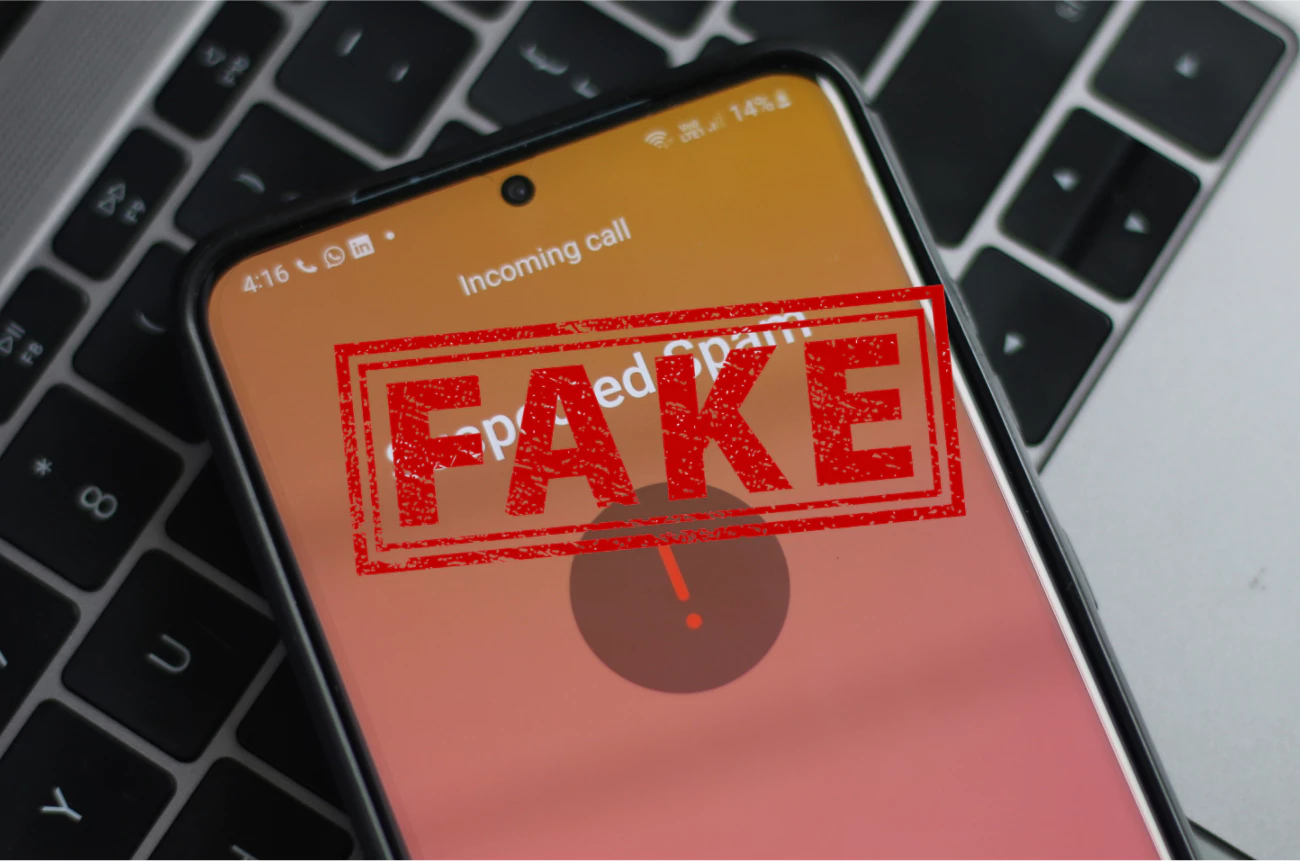
Extortion/scamming through false pretense
Watch out for messages from unknown senders saying you have won, or they can give you cash or help.
Prevalent Incidences include:
- Customer Service Fraud: Scams related to applications for new connections, meter separation, meter replacement, faulty meters, outages, and additional load. This includes fake quotations.
- Disconnection Threats: False threats to disconnect customers due to supposed pending bills, often accompanied by fake bills.
- Social Engineering: Scams that involve soliciting critical personal information from unsuspecting customers, including ID numbers, account/meter numbers, and application reference numbers.
- Wayleaves Deception: Fraudulent activities related to transformer leases and wayleaves.
- Phishing: Attempts to obtain sensitive information through deceptive emails and other communications.
Stay safe, Jua For Sure, by dialing *977# or on the myPower app.

Impersonation of Kenya Power Staff (Employees and Contractors)
Fraudsters and other criminals often impersonate Kenya Power (KPLC) staff, including employees and contractors, to commit various illegal activities. These impersonators may carry fake identification and wear uniforms that resemble those of legitimate KPLC personnel to gain the trust of unsuspecting customers. Their fraudulent activities can include:
- Fraud and Theft: Pretending to be KPLC agents to steal money or valuables from customers.
- Vandalism: Damaging electrical infrastructure such as transformers and power lines.
- Illegal Connections and Disconnections: Performing unauthorized electricity connections or disconnections.
- Unauthorized Load Switching: Illegally switching customer loads on transformer phases.
- Demanding Payments: Removing transformer fuses and demanding payments to restore the electricity supply.
How to Safeguard Yourself:
- Verify Identity: Always ask for official identification from anyone claiming to be a KPLC employee or contractor. Verify their identity by calling Kenya Power's customer service hotline or checking their credentials on the official Kenya Power website.
- Confirm Work Orders: If someone comes to your premises claiming to perform work on behalf of KPLC, confirm the work order with Kenya Power directly. Legitimate KPLC staff will have proper documentation and authorization.
- Be Cautious with Payments: Never make payments to individuals claiming to be KPLC staff without verifying their identity and the legitimacy of the charges. All payments for KPLC services should be made through official channels, such as authorized payment centers or the Kenya Power website.
- Report Suspicious Activity: If you encounter anyone suspicious claiming to be from KPLC, report them immediately to Kenya Power and the relevant authorities. Provide as much information as possible, including descriptions, names, and any provided identification details.
- Educate Yourself and Others: Stay informed about common impersonation scams and share this information with your community. Regularly visit the Kenya Power website for updates and alerts regarding fraudulent activities.
Stay safe, Jua For Sure, by dialing *977# or on the myPower app.

Fake Job Opportunities
Fraudsters often advertise non-existent job opportunities claiming to be from Kenya Power. They may use official-looking documents, emails, or websites to lure job seekers into believing these opportunities are legitimate. These scams typically involve requests for personal information, payment for job application processing, training fees, or other fraudulent charges.
How to Safeguard Yourself:
- Verify Job Listings: Always check the official Kenya Power website or trusted job boards for authentic job postings. Avoid relying on unsolicited job offers received via email, social media, or other unofficial channels.
- Check Contact Details: Ensure that any communication you receive is from an official Kenya Power email address or phone number. Be wary of contact details that do not match those provided on the official Kenya Power website.
- Never Pay for a Job: Kenya Power does not charge any fees for job applications, training, or processing. If you are asked to make any payments, it is a red flag for fraud.
- Report Suspicious Activity: If you encounter any suspicious job offers or requests for personal information, report them immediately to Kenya Power and relevant authorities. This helps prevent others from falling victim to the same scam.
- Educate Yourself: Stay informed about common job-related scams and regularly visit the Kenya Power website for updates and alerts regarding fraudulent activities.
Stay safe, Jua For Sure, by dialing *977# or on the myPower app.

Fake Kenya Power Branded Digital Assets
Fraudsters create fake social media handles, accounts, or websites that mimic Kenya Power's official branding to deceive customers. These fraudulent platforms may advertise or sell fake Kenya Power prepaid meters, tokens, or services. They exploit the trust of unsuspecting individuals by offering enticing deals or promises related to electricity services.
Common Scams:
- Fake Prepaid Meters and Tokens: Fraudulent websites or social media accounts may claim to sell Kenya Power prepaid meters or tokens at discounted rates. They may provide fake tokens that do not credit electricity units to customers' meters after purchase.
- Misleading Advertising: Scammers use Kenya Power logo and branding to promote nonexistent services or products, such as meter installations, special offers, or maintenance services. They may request personal or financial information under false pretenses.
How to Safeguard Yourself:
- Verify Official Channels: Use only official Kenya Power channels for transactions and information. Visit the official Kenya Power website (www.kplc.co.ke) for updates, services, and contact information.
- Check Social Media Handles: Verify the authenticity of social media handles and accounts claiming to represent Kenya Power. Look for verified badges or official announcements confirming the account's legitimacy.
- Beware of Unrealistic Offers: Be cautious of offers that seem too good to be true, such as heavily discounted prepaid meters or tokens. Verify such offers directly through Kenya Power's official channels before making any purchases.
- Secure Transactions: When making online transactions related to Kenya Power services, ensure that the website is secure (look for HTTPS:// in the URL) and use trusted payment methods. Avoid entering personal information on suspicious websites or links.
- Report Suspicious Activity: If you encounter a fake KPLC branded website, social media account, or any suspicious online activity, report it immediately to Kenya Power and relevant authorities. Provide details such as URLs, screenshots, and descriptions to assist in their investigation.
- Educate Others: Spread awareness about the risks of online fraud and encourage others to verify information and sources before engaging with KPLC-related services online.
Stay safe, Jua For Sure, by dialing *977# or on the myPower app.

Fraudulent Tender Adverts
Fraudulent tender adverts involve scammers who create fake advertisements for non-existent procurements, tenders, or contracts purportedly from Kenya Power. They may also falsely promise to facilitate bidders in ongoing legitimate tenders. These scams aim to deceive individuals or companies into paying fees or providing sensitive information under false pretenses.
Common Scams:
- Non-Existent Procurements/Tenders/Contracts: Scammers create fictitious tender notices or procurement opportunities using Kenya Power's name and branding. They may request payment for bidding documents, processing fees, or registration costs, claiming these are necessary to participate in the tender.
- False Facilitation Claims: Fraudsters may promise to assist bidders in securing contracts in ongoing legitimate tenders. They may request upfront payments or personal information, falsely claiming it will enhance the bidder's chances or expedite the process.
How to Safeguard Yourself:
- Verify Official Notices: Check the authenticity of tender advertisements by visiting the official Kenya Power website (www.kplc.co.ke) or contacting Kenya Power's procurement department directly. Legitimate tenders and procurements are typically announced through official channels and publications.
- Ignore Unsolicited Offers: Be cautious of unsolicited emails, messages, or calls offering assistance in securing tenders or contracts. Legitimate procurement processes do not require payment or personal information upfront.
- Confirm Contacts: Verify the contact details provided in tender adverts or communication. Use official contact information from Kenya Power's website or official procurement announcements.
- Consult Procurement Guidelines: Familiarize yourself with Kenya Power's procurement guidelines and processes. Understand the requirements and procedures for participating in legitimate tenders to avoid falling for fraudulent schemes.
- Report Suspicious Activity: If you suspect a fraudulent tender advert or receive suspicious offers related to Kenya Power tenders, report it immediately to Kenya Power's procurement department and relevant authorities. Provide details such as the advert content, sender information, and any communications.
- Educate Stakeholders: Raise awareness among colleagues, business associates, and stakeholders about the risks of fraudulent tender schemes. Encourage them to verify the legitimacy of procurement opportunities before taking any action.
By exercising caution, verifying information, and following official procedures, you can safeguard yourself and your organization from falling victim to fraudulent tender adverts related to Kenya Power.
Stay safe, Jua For Sure, by dialing *977# or on the myPower app.

eProcurement
Downloads

USSD

National Contact Center

Support Email

Kolobot Rd

P.O. BOX
© 2025 - Kenya Power. All rights reserved.







